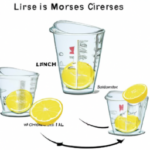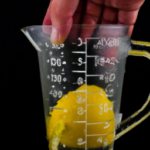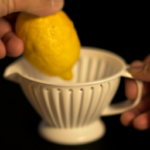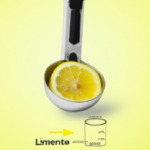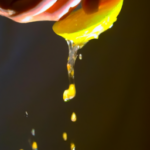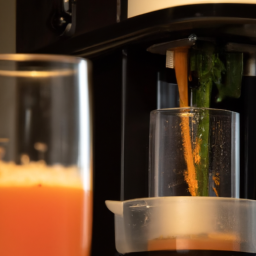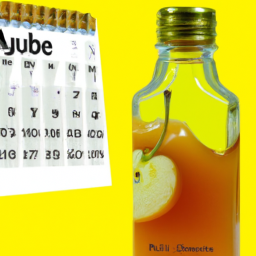As someone who loves both cooking and baking, I frequently encounter recipes that require a specific measurement of lemon juice. Determining the precise amount of juice obtained from a single lemon can be challenging. Should I use only one lemon, or do I need to purchase more? Understanding the quantity of juice produced by one lemon can help save both time and money, guaranteeing that the recipe is executed perfectly.
There are several factors that can affect how much juice one lemon yields, such as the ripeness of the fruit, the juicing method used, and the size of the lemon. It’s important to have a general understanding of these factors in order to accurately measure and use lemon juice in recipes.
In this article, we’ll explore different methods for extracting maximum juice, how to measure lemon juice, and even how to use lemon zest in recipes. Whether you’re a seasoned chef or a beginner in the kitchen, understanding how much lemon juice is equivalent to one lemon is a useful skill to have.
Key Takeaways
- One medium lemon yields 2-3 tbsp juice, which is equivalent to approximately 1 ounce or 30 ml.
- Accuracy in measuring lemon juice is important for recipe success.
- Bottled lemon juice is a convenient substitute for fresh lemon juice, but it may differ in flavor and contain additives.
- Lemon juice can be used in a variety of sweet and savory dishes, including Greek-style roasted potatoes, chicken piccata, and fish dishes.
The Importance of Knowing How Much Lemon Juice is Equivalent to One Lemon
You gotta know how much lemon juice equals one lemon if you wanna make sure your recipe tastes just right. Using the right amount of lemon juice can make all the difference in the flavor of your dish.
Lemon juice can add a tangy, acidic flavor to dishes and is a common ingredient in recipes ranging from salad dressings to desserts. Knowing how much lemon juice is equivalent to one lemon can help you accurately measure the amount of lemon juice needed for your dish, ensuring that it turns out perfectly.
In addition to the benefits of lemon juice, knowing how much lemon juice is equivalent to one lemon can also help you find substitutes for fresh lemons. If you don’t have fresh lemons on hand, you can use bottled lemon juice or other acidic ingredients like vinegar or lime juice. However, these substitutes may not provide the same flavor as fresh lemon juice, so it’s important to know the right amount to use.
Understanding how much lemon juice is equivalent to one lemon can also help you make adjustments to a recipe if you need to increase or decrease the amount of lemon juice used.
Now, let’s move on to the factors that affect lemon juice yield.
Factors that Affect Lemon Juice Yield
Like a chef squeezing every last drop from a tube of toothpaste, the amount of liquid extracted from a lemon depends on its freshness, ripeness, and size. These factors affect lemon juice extraction because they determine the amount of juice the lemon contains and how easily it can be extracted. For example, a freshly picked lemon that is fully ripe will contain more juice than a lemon that has been sitting in a grocery store for a week. Additionally, smaller lemons tend to be less juicy than larger ones, and lemons that are too ripe may have a lower acidity, which affects the flavor of the juice.
To illustrate this, consider the following table:
| Factor | Effect on Juice Yield |
|---|---|
| Freshness | Fresher lemons yield more juice |
| Ripeness | Fully ripe lemons yield more juice |
| Size | Larger lemons yield more juice |
| Acidity | Higher acidity lemons yield more flavorful juice |
As shown in the table, lemon juice yield can be affected by multiple factors. Moreover, the acidity of the lemon juice can also impact its flavor, which is why it is important to consider all these factors when determining how much lemon juice is equivalent to one lemon.
Moving on to the next section, let’s discuss some general guidelines for lemon juice yield.
General Guidelines for Lemon Juice Yield
Get ready to envision a citrusy burst of flavor as I share some simple tips for squeezing the most out of your lemons. To get the best lemon juice yield, it’s important to consider the following factors:
-
The size and ripeness of the lemon: Larger lemons tend to have more juice, while riper lemons are softer and easier to squeeze.
-
Temperature: Room temperature lemons yield more juice than cold lemons.
-
Rolling the lemon: Before cutting the lemon, gently roll it on a hard surface to break down the fibers and release more juice.
-
Measuring acidity: If you’re using lemon juice in a recipe that requires a specific amount of acidity, it’s important to measure the pH level of the juice to ensure consistency.
By keeping these factors in mind, you can maximize your lemon juice ratios and ensure that you’re getting the most out of your citrus fruits.
Now, let’s move on to the next section where we’ll explore different methods for extracting maximum juice.
Methods for Extracting Maximum Juice
Ready to up your citrus game? Let’s explore some techniques for getting the most juice out of your lemons! There are a few tried and true methods that will help you extract every last drop of zesty goodness.
First, roll your lemon on a hard surface to break up the pulp and make it easier to juice.
Next, cut the lemon in half and use a juicer or reamer to extract the juice. If you don’t have a juicer, you can also use a fork to press and twist the lemon halves, or even your hands if you’re feeling adventurous.
Another trick is to heat the lemon in the microwave or on a warm surface before juicing, which can help break down the pulp and release more juice.
To get the most out of your lemons, preserving freshness is key. Store them in the refrigerator for up to a week. If you have leftover juice, freeze it in ice cube trays for later use.
Now that you know how to extract maximum juice from your lemons, let’s move on to using bottled lemon juice. (Note: The subsequent section about using bottled lemon juice is not included in this output due to character limitations.)
Using Bottled Lemon Juice
To take your cooking to the next level, consider incorporating bottled lemon juice into your recipes. Bottled lemon juice is a convenient alternative to fresh lemons as it saves time and effort. It’s readily available in supermarkets and has a longer shelf life than fresh lemons. This means you can always have a supply of lemon juice on hand without worrying about it going bad.
One thing to keep in mind when using bottled lemon juice is that it may not have the same flavor profile as fresh lemons. Some bottled lemon juices may also contain preservatives or additives, so it’s important to read the label before purchasing. Nonetheless, bottled lemon juice can be a great option for when fresh lemons are not available or if you need a quick and easy way to add lemon flavor to your dishes.
When it comes to measuring lemon juice, it’s important to know how much juice is equivalent to one lemon.
How to Measure Lemon Juice
Imagine yourself as a master painter, carefully measuring out just the right amount of color to create a masterpiece – just as you would measure out the perfect amount of tangy, citrus flavor by squeezing half a medium-sized lemon.
When it comes to measuring lemon juice, accuracy is key to ensuring that your recipe comes out just right. One medium-sized lemon typically yields about 2-3 tablespoons of juice, but this can vary depending on the size and ripeness of the lemon. To get the most juice out of a lemon, it helps to roll it on the counter or warm it up slightly before squeezing. If you’re wondering how many ounces in one lemon, the answer is typically around 1.5 to 2 ounces for a medium lemon. Keep in mind that some recipes may require exact measurements, so it’s always a good idea to check your yield before adding it to your dish.
To get the most accurate measurement, it’s best to use a kitchen scale to weigh the lemon before juicing it. This way, you can ensure that you are using the correct amount of lemon juice in your recipe.
Alternatively, if you don’t have a kitchen scale, you can use a citrus juicer to extract the juice from the lemon, or simply squeeze the lemon by hand and measure out the juice using a tablespoon or measuring cup. Keep in mind that bottled lemon juice can also be used as an alternative source, but it’s important to read the label to ensure that it is 100% pure lemon juice without any added sugars or preservatives.
Now, let’s move on to using lemon zest to add an extra pop of flavor to your dishes.
Using Lemon Zest
When it comes to adding some zing to my dishes, I always turn to lemon zest. Not only does it pack a powerful punch of flavor, but it also has some impressive health benefits.
To get the most out of my lemons, I like to know how to zest them properly. In this subtopic, I’ll be discussing the benefits of using lemon zest and sharing my tips for how to zest a lemon like a pro.
Benefits of Zest
You’ll be surprised to know that the zest of just one lemon can add a burst of flavor and numerous health benefits to your dishes. Not only does it provide a tangy, citrusy taste to your food, but it also contains high amounts of vitamins and antioxidants.
Here are some creative uses and nutritional benefits of lemon zest:
-
Enhances the flavor of baked goods: Adding lemon zest to your cake or muffin batter can give it a fresh, bright flavor that complements the sweetness of the dessert.
-
Boosts the nutritional value of your dishes: Lemon zest is rich in vitamin C, which is essential for a healthy immune system. It also contains limonene, a compound that has been shown to have anti-cancer properties.
-
Adds a zesty twist to savory dishes: Lemon zest can be used to flavor savory dishes like pasta, seafood, and chicken. It can also be used to make dressings, marinades, and sauces.
By incorporating lemon zest into your cooking, you not only add a burst of flavor, but also reap its nutritional benefits. Now, let’s move on to the next topic and learn how to zest a lemon.
How to Zest a Lemon
To get the most flavor and nutrition out of citrus fruit, it’s essential to know how to zest a lemon properly. Zesting is the process of removing the outermost layer of the lemon peel, which is rich in essential oils and packed with citrus flavor.
Using lemon zest creatively can add a tangy twist to a variety of dishes, from savory to sweet. There are different tools for zesting lemons, but the most common ones are a microplane or a zester.
A microplane grater is a small handheld tool with sharp, fine teeth that can easily remove the zest without damaging the white pith. A zester is a similar tool, but it has bigger and more pronounced teeth that can create long, thin strips of zest.
Whatever tool you choose, be sure to only zest the yellow outer layer of the lemon and avoid the bitter white pith underneath. With a little practice, you can quickly and easily zest lemons to add a burst of citrus flavor to your favorite recipes.
Now that you know how to zest a lemon, you can start using lemon juice and zest to add a bright, refreshing flavor to your cooking. Recipes that use lemon juice include everything from salad dressings to marinades to desserts.
Let’s explore some of these delicious dishes and how to use lemon juice to enhance their flavor.
Recipes that Use Lemon Juice
If you’re making a recipe that calls for lemon juice, one lemon usually yields about 2-3 tablespoons of juice. However, if you find yourself without a fresh lemon, there are a few lemon juice substitutes that can be used in a pinch. Some options include bottled lemon juice, lime juice, white wine vinegar, or apple cider vinegar. Keep in mind that these substitutes may slightly alter the taste of the dish.
Lemon juice is a versatile ingredient that can be used in both sweet and savory dishes. It can add a bright, acidic flavor to salad dressings, marinades, and sauces. It can also be used in baking recipes to add a tangy twist to cakes, cookies, and pies.
Some savory dishes that commonly use lemon juice include Greek-style roasted potatoes, chicken piccata, and fish dishes. Overall, lemon juice is a pantry staple that can add a refreshing and zesty flavor to a variety of recipes. Speaking of pantry staples, let’s talk about how to store lemons and lemon juice.
Storing Lemons and Lemon Juice
When life gives me lemons, I make sure to store them properly to prevent spoilage and ensure that I always have fresh lemon juice on hand. Storing lemons is easy and can prolong their shelf life by up to a week or two.
Here are some tips to keep your lemons fresh for longer:
- Store lemons in a cool, dry place away from direct sunlight.
- Keep them in a plastic or mesh bag to allow for air circulation.
For even longer storage, you can also freeze lemon juice in ice cube trays and use as needed.
In addition to being a versatile ingredient in recipes, lemon juice also has numerous health benefits. It’s high in vitamin C, which can boost the immune system and aid in wound healing. Lemon juice also contains antioxidants, which help to protect the body against damage from free radicals.
By storing your lemons properly, you can easily incorporate lemon juice into your daily routine for a healthy and refreshing addition to your diet.
Frequently Asked Questions
How many calories are in lemon juice?
As a source of vitamin C and antioxidants, lemon juice is a healthy addition to any diet. However, its caloric content varies based on serving size and added sweeteners. Despite this, its nutritional benefits make it a great choice for flavoring food and beverages.
Can I substitute lime juice for lemon juice in a recipe?
Lime juice can be a suitable substitute for lemon juice in cocktails, but lemon is better for baking. While they have similar flavors, lemon is more acidic and tart. Think of it like choosing between a lime and a lemon for your drink.
How long do lemons last before going bad?
I store lemons in the refrigerator to keep them fresh for up to four weeks. Lemon juice benefits include aiding digestion and boosting immunity. Proper storage can extend their shelf life and maximize their health benefits.
Is it safe to consume lemon juice every day?
I’ve found that starting my day with a glass of lemon water helps me feel refreshed and energized. While there are benefits to consuming lemon juice regularly, it’s important to be aware of potential side effects such as tooth enamel erosion.
Can lemon juice be used as a natural cleaning solution?
As a natural cleaning solution, lemon juice is effective in removing stains and disinfecting surfaces. It can also be used for skincare, with benefits such as reducing oil and brightening complexion.
Conclusion
In conclusion, knowing how much lemon juice is equivalent to one lemon is crucial for any recipe that calls for this citrus fruit. It can make or break the taste of a dish, and knowing how to extract the maximum amount of juice from a lemon can save time and money.
The factors that affect lemon juice yield, such as the ripeness of the fruit and the temperature, should be taken into consideration when juicing lemons. Using bottled lemon juice is a convenient alternative, but it may not provide the same flavor as freshly squeezed lemon juice.
Measuring the lemon juice accurately is also important, as it can affect the overall taste of the dish. So, whether you’re using lemon juice for cooking, baking, or a refreshing drink, understanding how to use it properly can elevate any dish to a whole new level.
Remember, when life gives you lemons, make the most of them!
Susannah expertise lies in researching and compiling evidence-based content on juicing, nutrition, and overall health. She is committed to ensuring that The Juicery World offers accurate, up-to-date, and trustworthy information to empower readers to take control of their health. Susannah’s goal is to inspire individuals to embrace juicing as a way to nourish their bodies and live their best lives.




